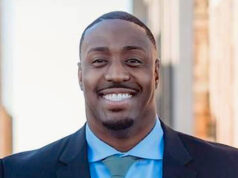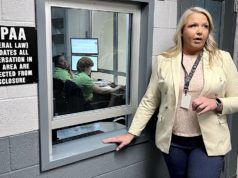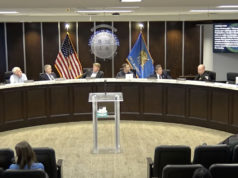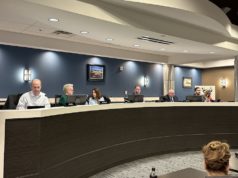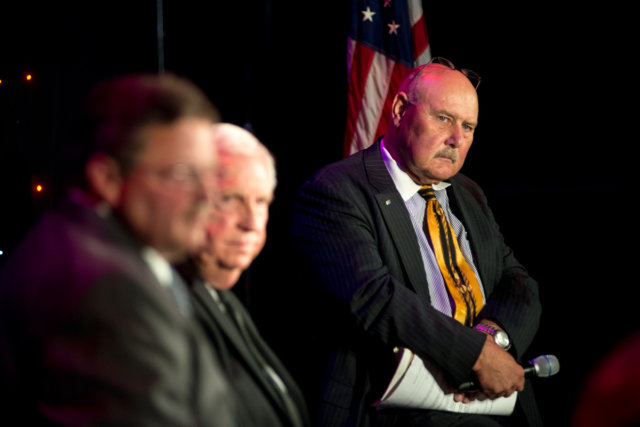

The three candidates for Oklahoma County Sheriff should all receive public appreciation for their participation in our Tussle at the Tower debate Wednesday night.
In response to a question about how they would improve relations with Oklahoma County’s black communities, however, the three white men each unintentionally devalued the experiences of black voters.
Their awkward answers should not disqualify them from holding office. Rather, the entire three-minute exchange should be seen as an opportunity for the candidates — and the community at large — to understand how conversations about race can rile up emotions when practiced with imprecise language.
What happened
The candidates were asked the following question at the end of Wednesday night’s debate:
The Black Lives Matter movement has drawn headlines and mixed responses over the past few years. Borne out of frustration with numerous dubious police shootings of African-Americans across the country, BLM is a simple acknowledgment of fact: Black Lives do Matter. How does each of you view that movement, and how would you help improve law enforcement relations in Oklahoma County’s black communities?
Democratic candidate and Oklahoma County Sheriff deputy Mike Hanson was directed to answer first. His message centered around the idea of meeting with African-American community members and how he had experience doing so.
VIDEO: The Tussle at the Tower
But Hanson repeatedly used the words “they” and “them,” which felt awkward and inherently separate from “us,” the all-white stage.
Additionally, he referenced having worked the county courthouse during the Daniel Holtzclaw trial, at which point Hanson said he interacted with Black Lives Matter members and “let” them sit in the courtroom.
Audience members posted frustration with those comments on social media. Specifically, some took issue with the insinuation that concerned citizens needed some sort of permission to attend the public trial. Additionally, it was noted that the community activists who rallied for justice in the Holtzclaw case had done so under the moniker OKC Artists for Justice, not BLM. (Not all black people engaged in calls for justice identify as Black Lives Matter.)
Still, Hanson’s answer drew far less criticism than the next two candidate responses.
Republican and acting-Sheriff P.D. Taylor answered second, eventually saying he has and will continue to meet with black leaders. But his initial response to the question was to assert that “all lives matter,” despite the statement being non-germane to the conversation.
The audience booed Taylor’s factually accurate but point-missing phrase. Of course all lives matter, but the movement Black Lives Matter seeks to highlight numerous racial disparities in criminal justice statistics and, of course, an unacceptable number of unnecessary black deaths at the hands of law enforcement.
Independent candidate Ed Grimes answered third, taking center stage to agree that “all lives matter” before offering an ill-conceived metaphor intended to imply he does not judge skin color.
“In my opinion, black is a color that you find in a box of crayons,” Grimes said to a shocked audience.
A woman in the front row yelled, “Really?” and others gasped audibly.
“Really,” Grimes replied to the woman.
Why the answers offended
In all, these race-related answers displayed discomfort and unfamiliarity with how to talk to black Oklahomans about a pressing social issue. The phrase “black lives matter” is not intended to slight any other group of people, and responding to it in any way other than acknowledging black requests for fair treatment from law enforcement intentionally ignores the problem.
To hear it put another way, listen to musician and actor Ice-T at the beginning of his provocative metal song No Lives Matter that argues, “When it comes to the poor, no lives matter.” From his monologue:
When I say “black lives matter,” and you say “all lives matter,” that’s like if I was to say, “gay lives matter” and you say “all lives matter.” Or if I said “women’s lives matter” and you say “all lives matter.” You’re diluting what I’m saying. You’re diluting the issue. The issue isn’t about everybody. It’s about black lives at the moment.
If the candidates’ “all lives matter” comments diluted the issues black citizens face in Oklahoma County, then Grimes’ comment about crayons dismissed an entire culture’s experience.
While it may have been politically tolerable in decades past for white Americans to say they don’t see race, comments on recent racial strife should avoid implying that skin color matters not. It certainly has an effect on people’s daily and cumulative lives, and anyone who argues otherwise is not spending enough time listening to the experiences of those different than them.
At the least, a learning moment
The debate’s foray into America’s most sensitive subject should be used as a learning moment. All three candidates stayed around after the debate and met with people who had been dismayed by some of their answers. All three men should be credited for listening and, hopefully, learning.
These conversations deserve dialogue within elections and outside of them. Finding common ground, understanding and progress requires one to recognize how statements are received — not simply how they are intended.










